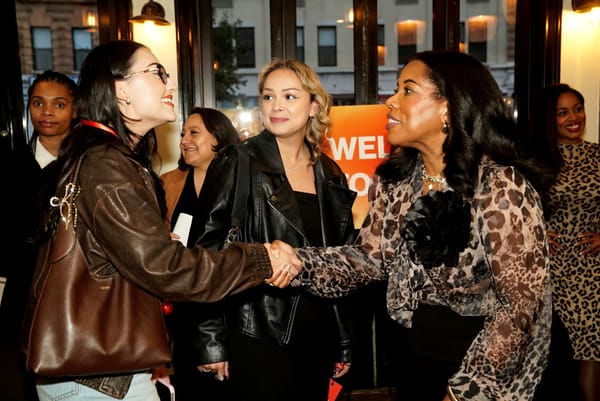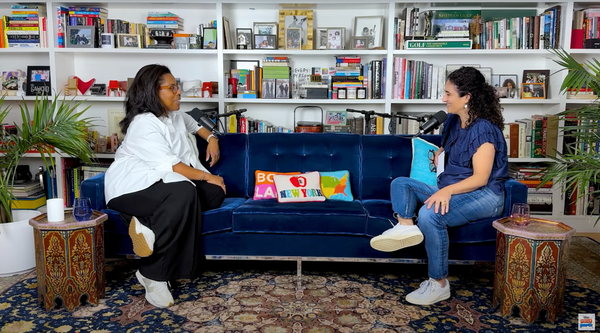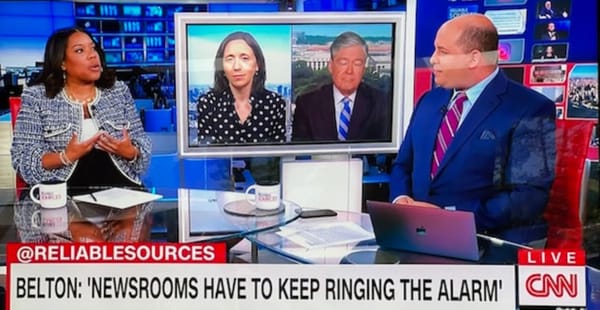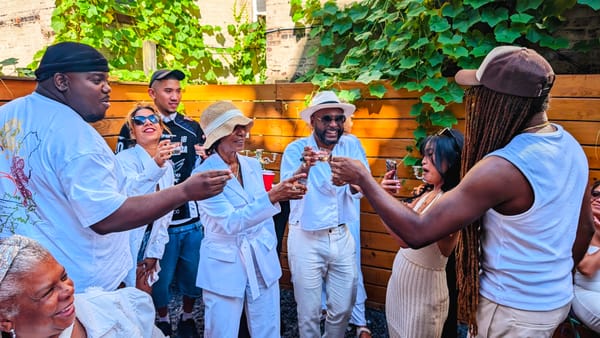Compassion for Others Gave Me Courage, But Belief in Myself Made Me Fearless
Courage and fearlessness are different from each other, but both are necessary for success in life and leadership.
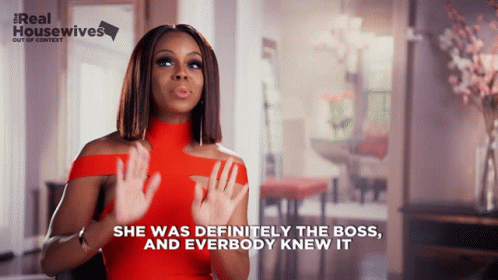
Recently my group of cohorts at Chief, an invite-only club for female executives and women who aspire to leadership, had a discussion on the difference between being fearless and having courage.
The convo sparked a lot of thoughts, feelings, and ideas, especially for me, in the role both being fearless and having courage have had on my career.
For me, being fearless is something you do, for yourself, with no care for the consequences, whereas courage is about real stakes and knowing the sacrifice one may be making in order to take a stance. For example, as a neurotic, anxiety-riddled kid, I was afraid of everything — the dark, loud noises, bright lights, dogs, heights, insects, my hair getting in my ears, disappointing my parents, and “getting in trouble” at school. So I’d hardly describe myself as a “fearless” child. I was not the kind of kid to jump into the pool when you know you can’t swim or run into the woods not knowing what awaits you there. I was more of a “fearful” kid, constantly stressed out by the world, craving any stability and safety.
But for what the Lord didn’t give me in fearlessness, he did make up for it by giving me all the courage in the world to stand on principle.
The Substack of the Writer Formally Known As The Black Snob is a reader-supported publication. To receive new posts and support my work, consider becoming a free or paid subscriber.
My fear was rooted in anxiety and I’ve always had anxiety, even as a kid. It used to manifest as a stomach ache and make getting through school days hard. The anxiety was related to a lot of things, but mostly to me being a highly sensitive child during a time when no one seemed to respect or care about that. As I’ve written before, I had my fair share of bullies, some violent, but most just cruel in their enjoyment of my humiliation and tears. No one, not the teachers, principals, or my mother seemed capable of doing anything about it because in the 80s and 90s, being a bullied child was seen as just a part of childhood and I needed to “toughen up.”
My mother seemed concerned about my self-esteem, but everyone else? It was pretty much a non-issue because “kids will be kids” was the attitude, even though we now know that prolonged periods of verbal assaults and ostracization for a child can be psychologically damaging well into adulthood.
Because I was bullied, and no one seemed to care, I decided when I was around 12 or 13 that if I saw someone being bullied I would speak up. Even though not one, solitary person ever said “chill” to anyone on my behalf, I felt that because I intimately knew how horrible it felt, I couldn’t be like the other kids who either did nothing or joined in. To me, they were followers or cowards or both and I never wanted to be any of those things.
I wanted to be brave and speak up. Even if I didn’t yet know how to do it for myself.
So, around the 8th grade, I became an anti-bullying PSA, armed with an arsenal of insults and putdowns to squash bullies in their tracks. I defended girls on my bus from sexual harassment. I challenged would-be bullies to play the dozens with me, where I would tell them “I bet you can’t go off on me without curse words” knowing that most children had a limited vocabulary and I did not. Why any bully agreed to my terms, I’ll never know, but they did and I’d go for the jugular, not caring if I hurt their feelings. Almost all of them tried to be friends with me afterward, but I wasn’t interested.
For some reason, it was easier for me to come to the defense of someone else than to defend myself, as I often silently took the abuse, and hoped that by showing no emotion, they’d get bored and move on. Sometimes this worked. Sometimes I was triggered into having a meltdown. By my junior year of high school, I was told by another girl in my class that I had a “reputation” as being “crazy” because of how I would react to the rudeness and cruelty of others.
She told me this because she was “surprised” that I wasn’t actually crazy and thought she was paying me a compliment.
But I didn’t really take it that way.
The last time I jumped in to defend someone from bullying as a kid was in the 12th grade when a girl whom I wasn’t close with was horseplaying in the high school pool with some boys, including a football player she was dating at the time. Somehow, in all their jostling around, her top came off and she was embarrassed. The boys, being obnoxious teens, were so thrilled to see some boobs they started to play keep-a-way with her bikini top. Seeing how no teachers were around and no one seemed to give a rat’s ass that she was clearly upset and crying, I left the bleachers, went down to the pool, and cursed the boys out, telling them to knock it off and give her top back. Since I never cursed back then I think it just surprised everyone, plus the boy who liked her seemed unaware that he was screwing up and my yelling kind of jostled him back to reality. He gave her the bikini top back and she grabbed it, then ran out of the pool to the locker room. I continued to berate her would-be boyfriend for being so rude and inconsiderate of her feelings.
Once things calmed down, I went back to the bleachers where some girls told me they wouldn’t have interfered because … reasons. Basically, their logic boiled down to they “didn’t like her” and she was a “ho who brought it on herself.” So I rolled my eyes and ignored them as they repeated how they wouldn’t have helped as if that were something admirable.
Their judgment didn’t affect me at all, other than this was the attitude I was routinely up against back in the 90s. Folks who just thought the world was cruel and it was every man, woman, and child for themselves. If you got picked on it was because you were “weak” or a “sucker” and being a “nice” person was a liability. I rejected these notions completely, convinced that being a just and fair person who was kind and respectful would win in the end.
And it did!
Like, hell if I know where any of the girls or boys who were rude to me are now. I know some ended up dropping out well before senior year because contrary to what TV tells you, it’s not the popular kids who make your life hell — half the time they don’t even know who you are — it’s the kids who feel marginalized and lash out because they feel so unloved and invisible. Almost all my bullies could be best described as either troubled kids from troubled homes with misplaced anger issues or borderline sociopaths nobody liked. The popular girls? They just ignored me and wrote me off as a weirdo. I wasn’t worth bullying to them because why? If you’re well-liked and confident you don’t need to drag me for funzies. You’re too busy living your best teen life.
As an adult though, fearlessness was more about my career and my unwavering belief in myself than anything else. I’ve never been afraid to start a job, lose a job, quit a job, move cross-country for a job, or find a job. Mostly because I’ve never had a hard time finding employment. I’d been working since I was a teen, earning $10s of dollars a week babysitting and running my “company” in Junior Achievement’s young entrepreneurship program. I always felt like I had “marketable skills” and if I didn’t know something, I could just learn. I also had the confidence that comes with having supportive parents who would help me out during times of struggle. But in the end, it always came down to my belief in myself — that I could succeed in my roles, I would never let myself down, and I could do the work and thrive.
I jumped in and out of jobs how others jumped in and out of relationships or underwear. I didn’t stress about the consequences because what was the worst that could happen? I’d lose the job? I had no responsibilities but myself, so if I lost it, only I would suffer. But the experience I’d get was invaluable. Also, I hated the “if only” game where you lament that “if only” you’d taken that risk, how would things be different now? I’d rather take the risk and find out than spend a lifetime “wondering.”
So fearlessness worked great for my personal efforts, but when I went into leadership, I had to dig deeper into my courage bag, because it was no longer just about me. It was about the team I supported and how I never wanted to let them down.
As a leader, I never saw things as a coronation. That I’d made it to the top and all had to bow down. I saw myself more as a shepherd or a facilitator. I was a protector and advocate, not a dictator. Sure, the buck stopped with me in many respects and I would have to make some difficult decisions, but I didn’t have to make them alone. I was never an “only I can fix it” person. It was always “We can fix it, together.”
Being a leader meant me learning how to be comfortable in my discomfort. I don’t like confrontation. I don’t like being “mean.” I want everyone to like me to a fault. All those things had to be dealt with in order for me to grow as a leader. I had to find the courage to confront situations and have hard conversations. I had to learn how to speak up for, not just myself, but for my entire team. And yes, sometimes, I had to hold a firm line or be “mean” and work through whatever that wrought. A lot of this was learned the hard way, through trial and error after error after error.
I realized years later why I was attracted to leadership. It wasn’t ego or my desire for control — I was trying to solve a problem. When I was younger, the problem was no one wanted to be responsible for making sure the work got done in group projects. I cared about my grades, so I often volunteered to be the lead because I knew how other kids simply weren’t as serious and if I wanted to maintain my GPA, I needed to do this. When I got older, the problem was more complex, but essentially the same — I saw how detrimental terrible leadership could be to a team. Nothing got done. Businesses floundered. Newsrooms fell apart. Usually due to the very fragile egos of leadership. I didn’t know if I’d be a good leader, but I did know I would NOT be a cancerous, malignant one. I would not be the thing standing in the way of a newsroom’s success.
After all, I wasn’t someone who “needed” to be right. I needed to “win.”
Winning means being willing to take criticism, seek feedback, learn from mistakes and grow, and empower your teams to make decisions with you, and for you to never make decisions without them. I needed more courage — courage to make mistakes and learn from them; courage to accept feedback, even when it was hard to hear; courage to take responsibility, admit my shortcomings then do my best to overcome them.
If fearlessness in my career had gotten me to the C-suite, then courage would keep me there.
You definitely need both.
The Substack of the Writer Formally Known As The Black Snob is a reader-supported publication. To receive new posts and support my work, consider becoming a free or paid subscriber.
